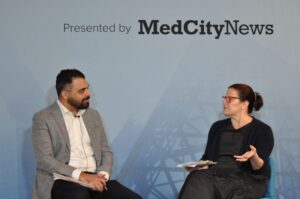
From left to right: Taha Jangda, managing director, Ascension Ventures; Beth Andrews, chief digital health officer, life sciences & healthcare, Dell Technologies
Data is vital in advancing healthcare, as it helps providers understand patients better and make more educated decisions on their care. However, the vast majority of health data isn’t used, according to one healthcare executive.
“It’s difficult to connect, curate, normalize and work with data keys. Think of monitoring patients, there’s data in the EHR, you can run AI on that data. But what you’re not seeing or what you’re missing there is, for example, it’s estimated 900,000 data points of patient data on a critical care bed are thrown away per patient per hour. … 97% of the data today in healthcare is not used and it’s not used because it’s difficult to wrangle,” said Beth Andrews, chief digital health officer of life sciences and healthcare at Dell Technologies.

With the Rise of AI, What IP Disputes in Healthcare Are Likely to Emerge?
Munck Wilson Mandala Partner Greg Howison shared his perspective on some of the legal ramifications around AI, IP, connected devices and the data they generate, in response to emailed questions.
Andrews made these comments during a fireside chat at the MedCity News INVEST Digital Health conference, which was held last week in Dallas. Prior to working at Dell Technologies, Andrews worked at Medtronic and Moving Analytics. The session was moderated by Taha Jangda, managing director of Ascension Ventures.
Pharma and clinical trials are good examples of when data is often not being used because the data is “disparate and siloed,” Andrews added.
There is a way to improve the process of using data, however.
“Normally setting up to use federated learning or to kind of clean that data to get it that [protected health information], that can be a 12 to 18-month process. If you’re able to do something like confidential computing with a secure enclave, you can actually move really quickly within a couple of months,” Andrews said. “This is really key for research, say for rare disease and needing to tap into different sources of data and do that with confidential computing the whole way. You can work on [protected health information] and you can also speed up that process.”
Federated learning is a process for training AI models “without anyone seeing or touching” the data, according to IBM Research. Confidential computing, meanwhile, refers to a cloud computing technology that separates sensitive data in a protected central processing unit enclave while it processes the data, IBM states.
Andrews also talked about the importance of data in cancer care. Dell Technologies recently joined CancerX, a public-private partnership launched by the White House that aims to spur innovation in the treatment of cancer.
“Three decades ago in 1990, there were 37 drug-related chemotherapy options with 60 indications,” Andrews said. “Today, there are well over 500 approved anti-neoplastic agents and it’ll keep growing. So we really need to be harnessing data and real-world evidence.”
Photo: MedCity News














